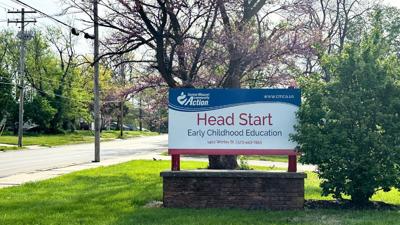WASHINGTON — Funding for scores of Head Start programs hung in the balance as the government shutdown continued Monday without an end in sight.
Unless a deal is reached to end the ongoing funding lapse that began Oct. 1, more than 65,000 children in 140 local Head Start programs across 41 states and Puerto Rico will not get their federal grant funding come Nov. 1, according to the National Head Start Association. The federal government spent about $12.3 billion on the program in fiscal 2025.
Community programs that receive Head Start funding have different start dates for when their grants are available.
Head Start helps fund roughly 1,600 community programs that served more than 790,000 children during the 2023-2024 program year.
The program is managed by the U.S. Department of Health and Human Services, and the employees in that agency who would disburse those awards are currently furloughed because of the shutdown.
Six programs serving 6,525 children did not receive a grant award Oct. 1 and are already tapping into outside resources and local funds to stay afloat. If the shutdown continues past Friday, another 134 programs that serve 58,627 children will lose federal grant funding.
In Kansas City, Mayor Quinton Lucas recently warned that Head Start centers that serve 2,300 children will have to shutter if the federal government remains closed. In southeast Missouri, grant cycles for local Head Start centers don’t run out until Jan. 1.
Head Start provides early childhood education, nutritious meals, health screenings and other support services to low-income families.
It is a discretionary program and subject to congressional approval each year, making it particularly vulnerable to the government shutdown.
“There’s just so much instability … that this is causing,” Tommy Sheridan, deputy director of the advocacy group the National Head Start Association, told States Newsroom. “And while we’re hopeful and we’re going to be doing everything we possibly can to try to minimize the impact directly on children and families, there is going to be a long-term impact, no matter what, that is felt.”
Shutdown standoff
The shutdown began Oct. 1, the start of the fiscal year, when Congress failed to appropriate money for federal programs.
Democrats have voted against bills that would temporarily reopen the government as they ask Republicans to negotiate a fix to expiring tax credits for health insurance premiums purchased on the Affordable Care Act marketplace. Republicans have refused to negotiate while the government is shut down, leading to an ongoing stalemate.
In a statement Monday, Emily Hilliard, a spokesperson for HHS, blamed the impending lack of funds on Democrats.
“More than 58,000 children are on course to lose access to Head Start funding and programs on November 1 due solely to the Democrat-led government shutdown,” she wrote.
Hilliard added that “the Trump Administration is committed to reopening the government for the American people.”
‘Collateral damage’
Sheridan criticized the political landscape that will likely lead to a lack of funding.
“I can’t stress enough — this is purely due to politics,” Sheridan said. “This has nothing to do with Head Start not being an effective program or people in Congress and the administration not supporting Head Start.”
He pointed to the “strong bipartisan support” the program has received since its launch in 1965.
“This is just us being collateral damage in a bigger fight that is going to be hurting working families and children,” Sheridan added.
Sheridan noted that “when programs don’t have access to federal resources, generally speaking, they can try, depending on the size of the program, to stay open for a certain period of time, but they’re going to be basically using other funds, and then would be reimbursing those costs down the road, kind of like an accounting maneuver, to be able to keep their programs running.”
He added: “That’s why we’re seeing so many programs either close or have to consider closures or things of that kind and why … we are just urging Congress and the administration to stop having children and families be the collateral damage of a political fight.”
Consequences for local Head Start programs
For programs that have to shut down because of the loss of federal funding, Sheridan pointed to several impacts.
Children would lose access to healthy meals and other resources. Families would be without affordable child care options, forcing some to quit their jobs or reduce their work hours. Community members could see economic ripple effects if staff who work in Head Start programs lose their paychecks or their jobs.
“We also have community partners that we rely on for services, and they rely on us for business — small businesses, contractors, vendors, other small businesses, things like that — but they rely on their Head Start contracts, and if we can’t pay the bills, they’re not going to be able to count on us for what they need as well,” he said.
Program already reeling
Under President Donald Trump’s administration, the program was already experiencing chaos prior to the government shutdown, including reports of delays in accessing approved grant funding, regional office closures and firings at HHS’ Office of Head Start.
That office also told grant recipients in March that it “will not approve the use of federal funding for any training and technical assistance (TTA) or other program expenditures that promote or take part in diversity, equity, and inclusion (DEI) initiatives.”
A federal judge in September temporarily blocked the administration’s directive that aimed to prevent immigrants living in the United States illegally from accessing Head Start programs.
Meanwhile, Trump’s fiscal 2026 budget request calls for maintaining Head Start funding at its prior fiscal year level of roughly $12.3 billion.
The Senate Appropriations Committee passed its annual bill to fund HHS, including Head Start, back in July and provided $12.4 billion for the program, a roughly $85 million increase.
The corresponding panel in the House also approved its bill to fund HHS in September, aligning with the administration’s request of maintaining funding for Head Start at $12.3 billion in fiscal 2026.
Sheridan pointed out that the program has operated through challenges before, whether natural disasters, the COVID-19 pandemic, or previous government shutdowns.
“Our programs are absolutely dedicated, hopeful and are working tirelessly to minimize that impact on children and families, but we cannot operate a program on hope and goodwill alone,” he said. “We need Congress and we need the president to come together to keep our classrooms open and also to ensure that Head Start funding can stay in line with the rising costs that we’ve seen over this last year.”















